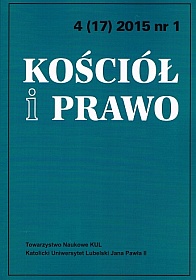Legal Awareness in the Church, or the Awareness of the Church?
Abstract
The article entitled “Legal Awareness in the Church, or the Awareness of the Church” presents the issue of the legal awareness of the members of the Catholic Church against the broader background of the awareness of the Church. Members of the Church are bound by the norms of both ecclesiastical and secular law, the latter setting out the norms for a variety of issues crucial to the activities and mission of the Church. Not infrequently the norms of secular law are irreconcilable with the teaching of the Church, and Church members have to make informed and responsible decisions. Such a situation puts to the test the consistency of a state’s law with natural law, with which canon law endeavours to comply. Thus the article makes a synthesis of issues related to canon law with questions framed by legal theory, the philosophy of law, and by ecclesiology. The author adds his voice to the debate concerning the significance and level of ecclesiastical and legal awareness of the members of the Church, and in particular of lay people. The article addresses the definition and areas of legal awareness, the content and meaning of the awareness of the Church, and also the role of legal awareness in the mission of the Church. In the conclusion of the article there is a summary of the issues it addresses.
References
Feinberg Joel, The Nature and Value of Rights, New York 1970.
Gerosa Libero, Prawo Kościoła, tłum. ks. Pękalski Ireneusz, Poznań 1999.
Girlanda Gianfranco, Wprowadzenie do prawa kościelnego, tłum. Kobiałka Stanisław, Kraków 1996.
Katolicyzm A-Z, red. ks. Pawlak Zbigniew, Łódź 1989.
Gryniuk Anna, Świadomość prawna (Studium teoretyczne), Toruń 1979.
Jedynak Stanisław, w: Mały słownik etyczny, red. Tenże, Bydgoszcz 1994, s. 224.
Kasprzak Sylwester SVD, Wybrane zagadnienia z Prawa Kościelnego, Lublin 2000.
Kojder Andrzej, Godność i siła prawa. Szkice socjologiczno-prawne. Warszawa 2001.
Krukowski Józef, Godność ludzka podstawą praw i wolności człowieka w umowach międzynarodowych, w: Kultura i prawo. Materiały I Międzynarodowej Konferencji na temat „Podstawy jedności europejskiej”, Lublin, 23-25 września 1998, red. Tenże i Theisen Otto, Lublin 1999, s. 193.
Krukowski Józef, Polskie prawo wyznaniowe, Wyd. IV, Warszawa 2008.
Krukowski Józef, w: Dyduch Jan, Góralski Wojciech, Górecki Edward, Krukowski Józef, Sitarz Mirosław, Komentarz do Kodeksu Prawa Kanonicznego, Poznań 2005, s. 41-42.
Lang Wiesław, Świadomość prawna, w: Lang Wiesław, Wróblewski Jerzy, Zawadzki Sylweter, Teoria państwa i prawa, Warszawa 1986.
Łętowska Ewa, Trudności w przyswajaniu w Polsce praktyki państwa prawa, w: Zasada demokratycznego państwa prawnego w Konstytucji RP, red. Wronkowska Sławomira, Warszawa 2006, s. 205-209.
Oniszczuk Jerzy, Filozofia i teoria prawa, Warszawa 2008, s. 682–683.
Pismo Święte Starego i Nowego Testamentu. Biblia Tysiąclecia, wyd. 4, Poznań - Warszawa 1991.
Radbruch Gustav, Pięć minut filozofii prawa, w: Tegoż, Filozofia prawa, tłum. Nowak Ewa, Warszawa 2009, s. 241-243.
Stadniczeńko Stanisław Leszek, Urzeczywistnianie prawa w zatrudnianiu młodocianych w okresie transformacji, Opole 2000.
Stelmachowski Andrzej, Zarys teorii prawa cywilnego, Wydanie 1, Warszawa 1998.
Studnicki Franciszek, Znajomość i nieznajomość prawa, „Państwo i Prawo” Nr 4/1962, s. 578-579.
Wojtyła Karol, Miłość i odpowiedzialność, Lublin 2010.
Wojtyła Karol, Słowo końcowe po dyskusji nad Osobą i czynem, w: Tegoż, Osoba i czyn oraz inne studia antropologiczne, Lublin 2000.
Zamelski Piotr, Równowaga praw i obowiązków implikacją zasady dobra wspólnego, Lublin 2014.
Ziembiński Zygmunt, Wykłady socjologii dla prawników i administratywistów, Wydawnictwo Przemiany 1990.
Copyright (c) 2015 Kościół i Prawo

This work is licensed under a Creative Commons Attribution-NonCommercial-NoDerivatives 4.0 International License.





